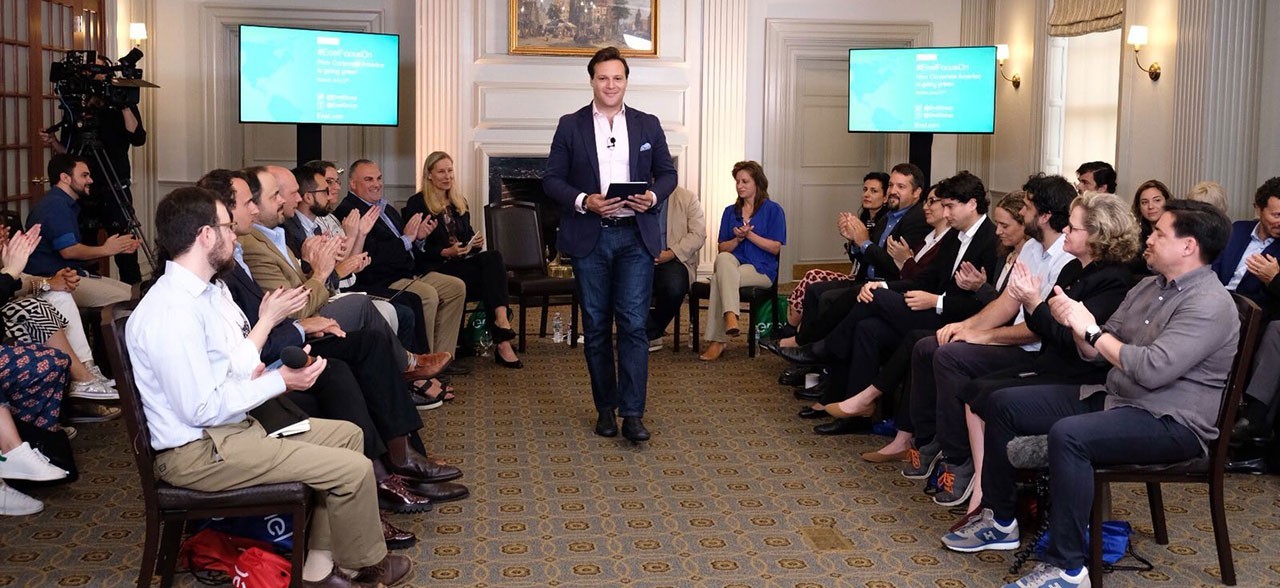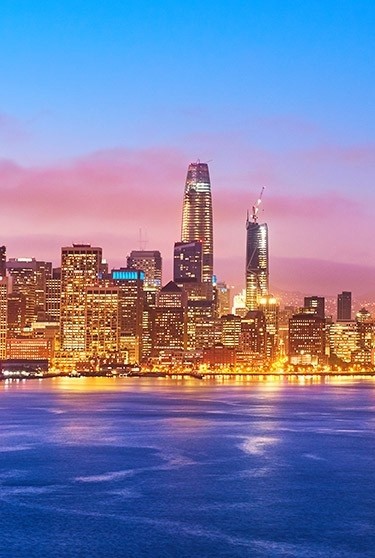The blue of the Facebook logo has a green tinge, as do the labels of dozens of brands of beer. This is not a decision led by communication strategies but a question of necessity. Green is the colour of renewable energy, which reduces the environmental impact of the famous social network’s servers and the production facilities of some of the world’s most popular beers. And behind all of this is the contribution of our Group.
How corporate America is going green: this was the theme of the tenth #EnelFocusOn, the global cycle of talks about the future organised by Enel. This edition took place on 27 June in Boston at the prestigious Harvard Faculty Club (across the River Charles, in Cambridge). Guests included The Climate Group, Facebook, Anheuser-Busch, one of the world’s leading beer producers, as well as 16 influencers from nine different countries in Europe and the American continent. Ryan O’Keeffe, Director of Communications at Enel, pointed out that, for the first time ever, the event was not only carbon neutral, but actually carbon negative. Indeed, we compensated in excess of 100% of the CO2 footprint of all the participants who travelled to Harvard that day.
Major US corporations have embarked on the green road of environmental sustainability, and many of them, explained O’Keeffe, are doing so thanks to Enel Green Power, the world's main producer of renewable energy. Boasting 4.3 GW in North America alone, EGP generates four times the energy needs of the state of Massachusetts, which has a population of over 6.5 million.
Climate Change: a challenge to win
“In 2015,” O’Keeffe continued, “we launched Open Power, a vision and a roadmap designed to open energy to new uses and to create long-term sustainable value for our shareholders. Enel Green Power offers green solutions, helping its clients to achieve their sustainability goals in the long term. Today the greatest challenge that we face is climate change. Numerous large US companies are taking this challenge very seriously, and for each of them, Enel Green Power serves as an enabler, giving them the means with which to overcome it.”
However, as Amy Davidsen, Executive Director of NGO The Climate Group-North Americaand the keynote speaker at this edition of #EnelFocusOn, explained, the route to success is a complex one. Since 2004, the year of its foundation, this independent NGO has been working towards the goal of accelerating the actions to combat climate change. “We realised,” Ms Davidsen explained, “that the only way possible was to bring together large corporations, NGOs, utilities and governments in order to create a paradigm shift both in policy and the markets. Our approach to climate change has always been to see it less as a problem and more as an opportunity to create a better world through technological innovation. Major corporations are an integral part of this approach and it is essential to involve them in a joint effort. And companies like Enel Green Power are extremely important partners for us, because there wouldn’t be much point in persuading organisations to use renewable energy if nobody was actually producing it.”
According to Ms Davidsen, “to lower the temperature of the planet, it’s imperative to transform the entire global energy sector, by producing energy exclusively from renewables. And it’s necessary that an ever-increasing number of companies commit to using only renewable energy to power their production, services and transport with the electrification of their vehicle fleets.” So far The Climate Group has managed to bring together 137 large companies, an entity that, if viewed alongside nation states, would rank in 24th place in the world in terms of energy consumption. “In total,” she continued, “these companies operate in 122 countries around the world. Therefore they represent a significant force capable of influencing markets and incentivising an increasingly widespread use of renewables in those countries. And the list is growing constantly.”
Renewables and advantages for the companies
It’s important to underline that for each of these companies the decision to go green was not dictated solely by reasons of a so-called philanthropic nature, but rather by a precise economic calculation: in other words, going green is profitable. This was a point made by the guest who spoke after Ms Davidsen, Angie Slaughter, Vice President Sustainability, North America at Anheuser-Busch, the global brewing colossus that announced an agreement with Enel Green Power in September last year for the purchase of over 152 MW of clean energy from our Thunder Ranch wind farm, in Oklahoma. That figure represents half of the company’s annual consumption and will serve to produce 20 billion bottles of beer per year. It’s a huge leap forwards with respect to 2017, when Anheuser-Busch was relying on fossil fuels for 98% of its energy needs. “For us the conversion to renewables has provided only advantages,” explained Slaughter. “First of all, the price, which is now equal to or lower than the cost of conventional energy, and is expected to fall further. Then there is a significant improvement to our image among our customers, particularly the Millennials, who are more sensitive to environmental issues. Last but not least, it also helps us to attract talent, because people prefer to work for a responsible company that cares about the future of the planet.”
Echoing these sentiments was Peter Freed, Energy Strategy Manager at Facebook, another major corporation that is aiming to make its energy consumption 100% from renewable sources. Facebook, in actual fact, has chosen to build its next Data Center in the vicinity of our Rattlesnake Creek wind farm in Nebraska, from which it will acquire 320 MW of energy. “We are a global company and we are determined to contribute to finding global solutions to what is a global problem,” explained Freed. Back in 2011 Facebook made a commitment to embark on the road towards zero emissions, and announced its intention to achieve a 50% share of its energy consumption from renewables by 2018. “Until we reach 100%,” Freed added, “one of our priorities is to feed onto the grid renewable energy to compensate for what we are still consuming from conventional energy sources.”
Just a few months ago Anheuser-Bush launched a new slogan: “produced from 100% renewable electricity,” which appears on its cans of Budweiser beer. “In the United States we sell 15 million a day,” explained Ms Slaughter, “we hope that just some of those 15 million customers join in the shared effort, becoming promoters of a culture of sustainability.”
The key point is that the efforts of the major corporations are not enough: we need a fully-fledged cultural revolution worldwide. This means a profound change in the way we perceive energy and of the thoughts that we associate with the simple gesture of pressing the light switch. “In order to convince people of the need to face climate change, and therefore the need to switch to renewables,” said Amy Davidsen, “we have to discuss the economic impact: how much does global warming cost us? Just think of the three devastating hurricanes that struck the US last year; they caused hundreds of billions of dollars of damage, not to mention more than 4,000 deaths. The message is that we won’t be able to enjoy long-term economic prosperity unless we stop climate change.”
“There was a time when renewables were referred to as unconventional forms of energy, as opposed to conventional forms, as if there were some doubts about whether they would work or not,” explained Ryan O’Keeffe in his closing comments. “Today we know that not only does renewable energy work splendidly, but it is also the only way to save the planet, in addition to ensuring our shareholders sustainable value in the long term. So, to put it simply, renewable energy is the only option for the future.”





